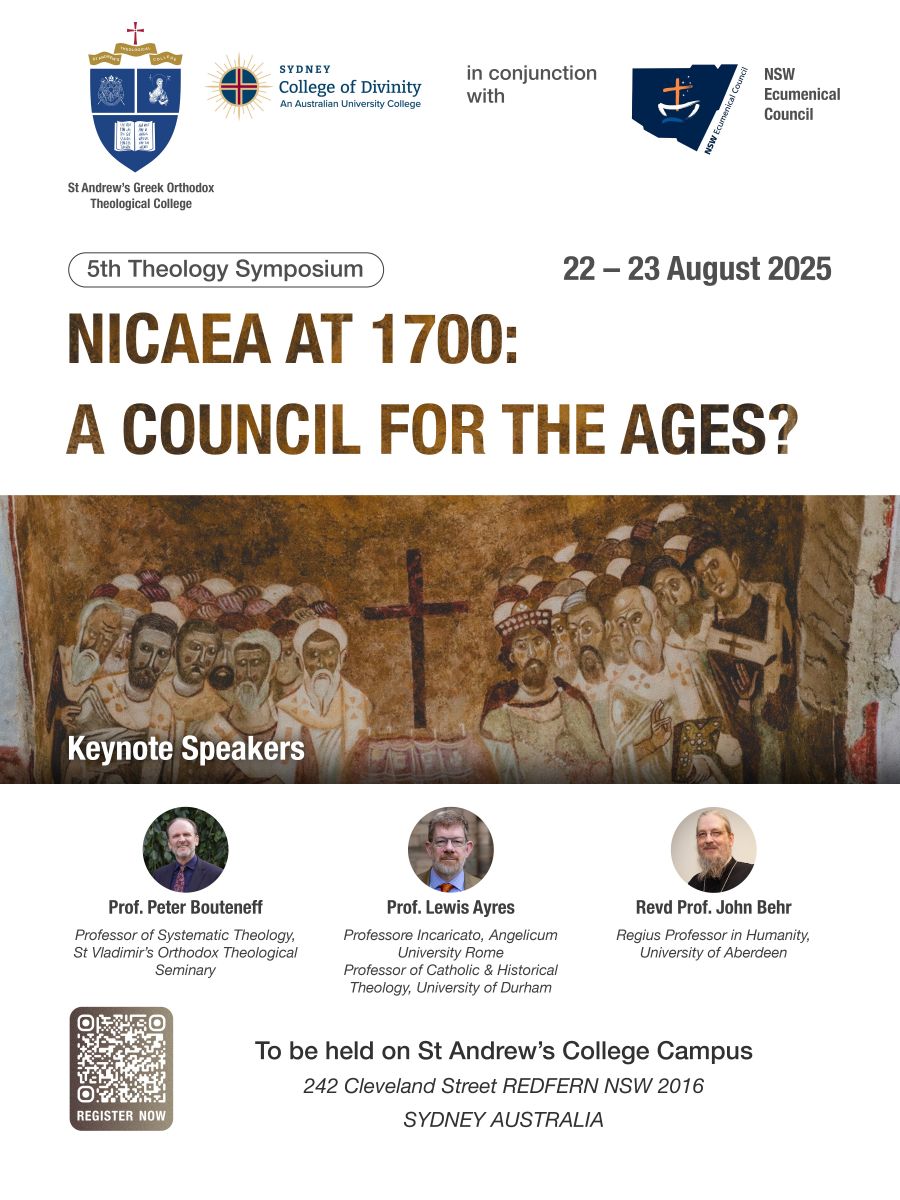- Home
- About us
- Students
- Courses
- Research
- Library
- News & Events
- Gallery
- Contact
- Our Blog
Latest News

5th Theology Symposium
Feb 24, 2025
admin
5th Theology Symposium
St Andrew’s Greek Orthodox Theological College
(Australian University College of Divinity)
in conjunction with The New South Wales Ecumenical Council
5th Theology Symposium
NICAEA AT 1700:
A COUNCIL FOR THE AGES?
22-23 August 2025
to be held on the campus St Andrew’s College
242 Cleveland Street REDFERN NSW 2016
Join us for a truly enriching and edifying College event on 22-23 August 2025.
Come celebrate the 1700th anniversary of the First Ecumenical Council of Nicaea (325 AD) at a special conference hosted by our College, together with the NSW Ecumenical Council, from Friday 22 to Saturday 23 August 2025.
Discover the enduring significance of the Nicene Creed, explore its theological depth, and reflect on its meaning for the Church today—1700 years on.
Register now and be part of this historic commemoration!
https://www.trybooking.com/events/landing/1352928

Keynote Speakers
Prof. Peter Bouteneff
Professor of Systematic Theology, St Vladimir’s Orthodox Theological Seminary
“The Odyssey of the Homoousion”
Prof. Lewis Ayres
Professore Incaricato, Angelicum University Rome
Professor of Catholic and Historical Theology, University of Durham
“Why is Nicaea Important?”
Revd Prof. John Behr
Regius Professor in Humanity, University of Aberdeen
“‘God Stands in the Congregation of Gods’: Speaking of God Before and After Nicaea”
The Council of Nicaea, acknowledged by many Christian traditions as the first ecumenical synod of the Church, was summoned in the year 325 by Emperor Constantine the Great to resolve a subtle, yet essential, theological dispute that threatened to engulf both church and state and shatter the emerging unity of the nascent Christian Roman Empire. As the first council to aspire to universal status it became the paradigm, in both structure and aim, for all subsequent imperial synods of the first millennium.
While the Council’s main task was to adjudicate between the rival positions of the Alexandrian presbyter, Arius, and his bishop, Alexander, on the issue of the relationship between the Father and the Son, it succeeded not only in formulating a Creed that would serve as the model for later orthodox confessions of faith but also in establishing a canonical tradition that would form the basis for the future hierarchical and synodal polity of the Church. Furthermore, it sought to bring liturgical unity to the Church by decreeing a common formula in calculating date for Easter that has ramifications for Christian life to this day.
As we celebrate the 1700th Anniversary of Nicaea, we remain cognisant of the many ways this Council has shaped both the Christian faith and the church in history. Its theological, canonical and liturgical legacy continues to impact the outlook and thinking of contemporary theologians and church leaders, both within their own traditions and in the ecumenical context.
This theological symposium will therefore seek to reflect on the times, theology and legacy of this great council and consider its relevance for Christian life and thought in the twenty-first century and beyond. Itwelcomes presentations from the different disciplines of Christian theology, irrespective of their field of expertise, academic affiliation or denominational background. Indeed, it is hoped that a cross-disciplinary approach (whether this be systematic theology, patristics, ethics, biblical studies, church history, liturgics, etc.) will contribute by casting further light – indeed a more enriching and holistic perspective – on this most prominent council of the Church and its enduring significance.
The Convenors ask that a title of the proposed presentation be submitted together with an abstract of 250 - 300 words by Monday 20th June, 2025. Accepted speakers will be notified by Monday 30th June, 2025.
The proposal should also be accompanied by the following contact details: a) Title, b) Name, c) Institutional affiliation, d) postal address, e) phone number and f) e-mail address.
All submissions should be addressed to Assoc. Prof. Philip Kariatlis ([email protected]).
Doctoral students are also encouraged to present a paper. Please submit a complete version of your paper with an abstract by Monday 21st July 2025.

.jpg)





.png)